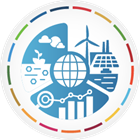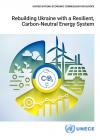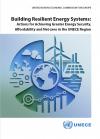Resilience and Carbon Neutrality
Introduction

UNECE is helping countries to build resilient and carbon neutral energy systems. These concepts were endorsed by member States during the 31st session and the 32nd Session of the Committee on Sustainable Energy. This overarching topic guides the efforts of all 6 subsidiary bodies of the Committee, with the theme of resilient energy systems being embedded in respective workplans of these expert groups.
In 2023 we launched a joint and collaborative multi-stakeholder initiative, the Platform on Resilient Energy Systems, a place where UNECE is strategically collaborating on creating an AI-powered tool for informed decision-making, together with a number of international organizations, such as European Investment Bank (EIB), International Atomic Energy Agency (IAEA), International Energy Agency (IEA), International Renewable Energy Agency (IRENA), International Telecommunications Union (ITU), Organization for Security and Co-operation in Europe (OSCE), United Nations Economic Commission for Latin America and the Caribbean (ECLAC), United Nations Economic and Social Commission for Asia and the Pacific (ESCAP), United Nations Economic and Social Commission for Western Asia (ESCWA), United Nations Industrial Development Organization (UNIDO), the World Bank, World Meteorological Organization (WMO), etc.
The Platform builds on the UNECE Carbon Neutrality Toolkit which was developed for member States to help them identify technology and policy options and to maximize the use of all low- and zero-carbon technologies in achieving carbon neutrality by 2050. The toolkit is supporting member States in decarbonizing and building energy resilience by applying the findings of technology interplay at national and subregional levels.
In focus
Highlights
ACTIVITIES:
1. UNECE Carbon Neutrality Toolkit is helping countries to identify technology and policy options to attain carbon neutrality. UNECE applied this Toolkit in “Rebuilding Ukraine with a Resilient, Carbon-Neutral Energy System” . The UNECE Expert Community is now applying the Toolkit in Central Asia and in the Republic of Moldova.
2. UNECE Expert Community developed a concept on Building resilient energy systems in the UNECE region. A resilient energy system is ones where energy makes an optimal contribution to a country’s social, economic, and environmental development and that is able to withstand and recover quickly from any unanticipated shocks and reflects potential impacts of climate change on energy resources in its planning and operations.
Meetings and Events
Recent events:
32nd Session of the Committee on Sustainable Energy, 13-15 September 2023
3rd Almaty Energy Forum, 6-8 November 2023




